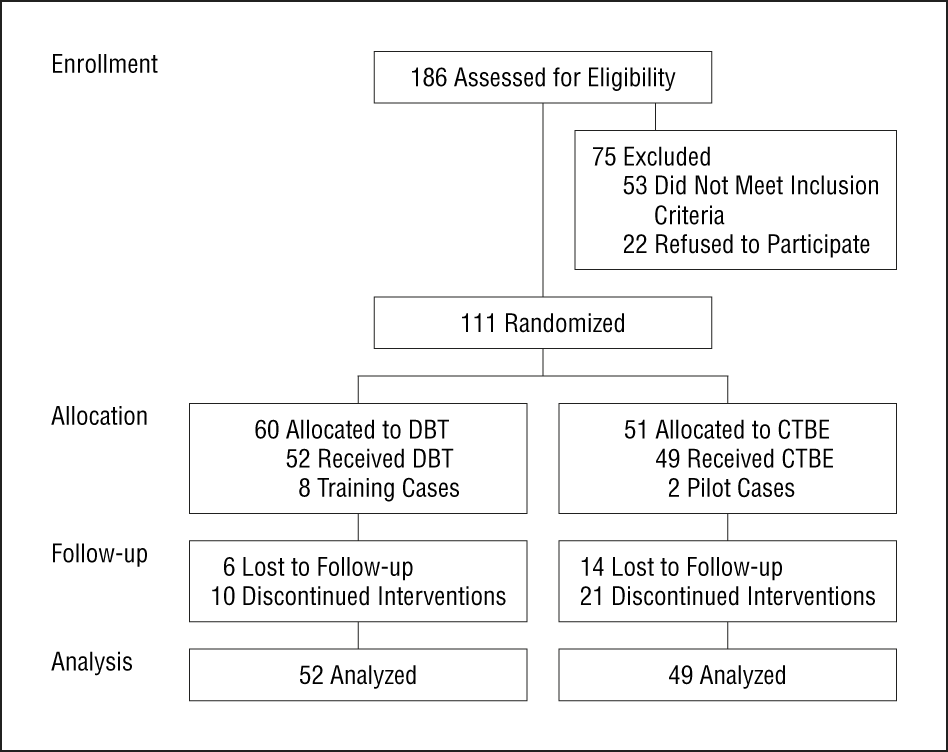Clarkin, J. F., Cain, N. M., & Lenzenweger, M. F. (2018). Advances in transference-focused psychotherapy derived from the study of borderline personality disorder: Clinical insights with a focus on mechanism. Current opinion in psychology, 21, 80-85.
Clarkin, J. F., Levy, K. N., & Schiavi, J. M. (2005). Transference focused psychotherapy: Development of a psychodynamic treatment for severe personality disorders. Clinical Neuroscience Research, 4(5-6), 379-386.
Clarkin, J.F., Levy, K.N., Lenzenweger, M.F., and Kenberg, O.F. (2007). Evaluating Three Treatments for Borderline Personality Disorder: A Multiwave Study. The American Journal of Psychiatry, 164, 922-928.
Doering, S., Horz, S., Rentrop, M., Fishcer-Kern, M. et al. (2010). Transference-focused psychotherapy v. treatment by community psychotherapists for borderline personality disorder: randomised controlled trial. British Journal of Psychiatry, 196, 389-395.
Fried, D., Crits-Christoph, P., & Luborsky, L. (1992). The first empirical demonstration of transference in psychotherapy.
The Journal of Nervous and Mental Disease,
180(5), 326–331.
The First Empirical Demonstration of Transference in... : The Journal of Nervous and Mental Disease
Gelso, C. J. & Bhatia, A. (2012). Crossing Theoretical Lines.
Psychotherapy, 49 (3), 384-390. doi: 10.1037/a0028802.
Gelso, C. J., Kivlighan, D. M., Wine, B., Jones, A., & Friedman, S. C. (1997). Transference, insight, and the course of time-limited therapy. Journal of Counseling Psychology, 44(2), 209–217.
APA PsycNet
Giesen-Bloo, J., van Dyck, R., Spinhoven, P., van Tilburg, W., Dirksen, C., van Asselt, T., et al. (2006). Outpatient psychotherapy for borderline personality disorder: Randomized trial of schema-focused therapy vs. transference-focused psychotherapy. Archives of General Psychiatry, 63, 649–658.
Goodman, G. (2013). Is mentalization a common process factor in transference-focused psychotherapy and dialectical behavior therapy sessions? Journal of Psychotherapy Integration, 23(2), 179–192.
APA PsycNet
Heim, A. K., & Westen, D. (2005). Transference patterns in the psychotherapy of personality disorders: Empirical investigation. The British Journal of Psychiatry, 186(4), 342-349.
Kernberg, O. F., Yeomans, F. E., Clarkin, J. F., & Levy, K. N. (2008). Transference focused psychotherapy: Overview and update. The International Journal of Psychoanalysis, 89(3), 601-620.
Leichsenring, F., & Leibing, E. (2007). Psychodynamic psychotherapy: a systematic review of techniques, indications and empirical evidence. Psychology and Psychotherapy: Theory, Research and Practice, 80(2), 217-228.
Levy, K. N. & Scala, J. W. (2012). Transference, Transference Interpretations, and Transference-Focused Psychotherapies.
Psychotherapy, 49 (3), 391-403. doi: 10.1037/a0029371.
Levy, K. N., Meehan, K. B., Kelly, K. M., Reynoso, J. S., Weber, M., Clarkin, J. F., & Kernberg, O. F. (2006). Change in attachment patterns and reflective function in a randomized control trial of transference-focused psychotherapy for borderline personality disorder. Journal of consulting and clinical psychology, 74(6), 1027-1040.
Marmarosh, C. L. (2012). Empirically Supported Perspectives on Transference.
Psychotherapy, 49 (3), 364-369. doi: 10.1037/a0028801.
Marmarosh, C. L., Gelso, C. J., Markin, R. D., Majors, R., Mallery, C., & Choi, J. (2009). The real relationship in psychotherapy: Relationships to adult attachments, working alliance, transference, and therapy outcome. Journal of Counseling Psychology, 56(3), 337–350.
APA PsycNet
Ogrodniczuk, J. S., Piper, W. E., Joyce, A. S., & McCallum, M. A. R. Y. (1999). Transference interpretations in short-term dynamic psychotherapy. The Journal of nervous and mental disease, 187(9), 571-578.
Robiner, W. N. (1987). An experimental inquiry into transference roles and age. Psychology and Aging, 2(3), 306–311.
APA PsycNet
Suszek, H., Wegner, E., & Maliszewski, N. (2015). Transference and its usefulness in psychotherapy in the light of empirical evidence. Roczniki Psychologiczne, 18(3), 363-380.
Ulberg, R., Hummelen, B., Hersoug, A.G.
et al. The first experimental study of transference work–in teenagers (FEST–IT): a multicentre, observer- and patient-blind, randomised controlled component study.
BMC Psychiatry 21, 106 (2021).
The first experimental study of transference work–in teenagers (FEST–IT): a multicentre, observer- and patient-blind, randomised controlled component study - BMC Psychiatry
Yeomans, F. E., Levy, K. N., & Caligor, E. (2013). Transference-focused psychotherapy. Psychotherapy, 50(3), 449.
Zilcha-Mano, S., McCarthy, K. S., Dinger, U., & Barber, J. P. (2014). To what extent is alliance affected by transference? An empirical exploration. Psychotherapy, 51(3), 424–433.
https://doi.org/10.1037/a0036566
I don't think it's impossible to study, just probably not really a funding priority. As you can see, some evidence exists for transference, but, of course, the science isn't settled. Personally, I think a multitrait-multimethod design would be a great way to study transference if psychometric evidence could be established for observed rated transference scale to be compared with clinician ratings of transference reactions and contrasted with, perhaps, skill deficit ratings. Idk I'm spitballing, but I could probably come up with something if given enough time and money
🙂
AND...to quibble with an earlier point you made: While I do agree that it is important to separate what's efficacious about treatment vs. the underlying mechanisms, you do have content experts operationalizing the concepts in an evidenced based practice. I know we all think of Shapiro when I say that, but from what I understand about TFT, the interventions on the relationship seem to be bulk of the protocol. If we're to generalize beyond transference, than maybe there's something in the sauce about relational interventions as being efficacious. I just got Judith Beck's latest edition of Cognitive Behavior Therapy and even she makes that admission.




